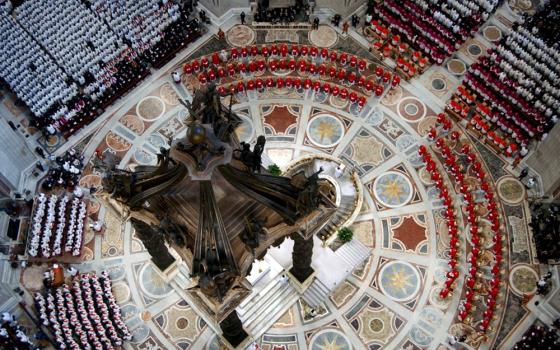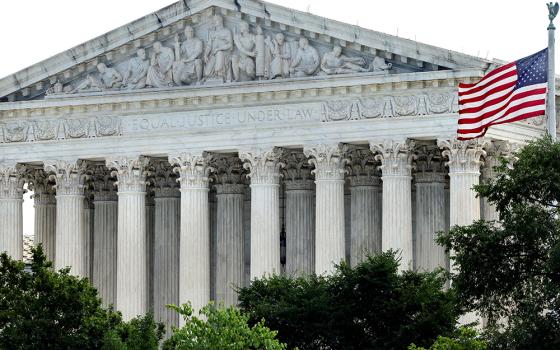Controversial anti-Muslim speaker and blogger Robert Spencer is slated to participate in a debate at Eastern Michigan University. The debate is being conducted by Al Kresta, the Catholic radio host of "Kresta in the Afternoon," which is distributed on Ave Maria Radio and EWTN. Earlier this year, two bishops, Robert McManus of Worcester, Mass., and Jaime Soto of Sacramento, Calif., canceled appearances by Spencer on Catholic premises because of his anti-Muslim bigotry.
These episodes raise the question -- and it is not an easy question -- as to who should be barred from being given a platform at a Catholic institution. In defending his decision to host the debate, Mr. Kresta said: "If having a debate like this is considered incendiary, then that's evidence that we need debates like this. People think you can only live together peacefully if you agree on everything, and that's not true." There is something to that sentiment, to be sure, especially at a university setting where, presumably, encouraging debate is one of the institution's primary goals.
There are limits. Holocaust deniers come to mind, and not only in the abstract. You may recall the controversy surrounding Columbia University's invitation to now-former Iranian President Mahmoud Ahmadinejad to speak on campus. In what meaningful sense can a debate be considered an intellectual endeavor when it includes a madman?
Mr. Spencer's vile anti-Muslim pronouncements certainly approach the level of bigotry we associate with Holocaust denial. He has made a career of cherry-picking especially violent passages out of the Quran and tarring the rest of Islam as violent on account of those passages. Of course, the same methodology could be used to indict Christians and Jews for whom Psalm 137 is considered the very Word of God: After its poignant opening line -- "By the waters of Babylon, there we sat down and wept, when we remembered Zion" -- the psalm concludes, "Happy shall he be who takes your little ones and dashes them against the rock!" Slaughtering children by dashing them against rocks does not, in fact, make me happy. This passage -- and there are others -- brings to mind the sage observation of Origen, the early third-century Christian exegete, regarding biblical literalism. Looking at Genesis and the account(s) of Creation therein, he asked, "who is so silly as to believe that God, after the manner of a farmer, planted a paradise eastward in Eden, and set in it a visible and palpable tree of life, of such a sort that anyone who tasted its fruit with his bodily teeth would gain life?" Well, it turns out, many fundamentalists believe precisely that all these centuries later. The point is that texts drawn from earlier centuries can almost always be cited to indict a given tradition.
In America today, there are only too many people willing to believe the worst about Muslims, which is why Spencer's writings and speeches are not merely mad: They are, as Kresta admitted, "incendiary." A madman can be written off, but a madman with consequence must be rebutted, and I am not sure a debate forum is the proper method of rebuttal. There are people, and I would put Spencer in that group, whose views are so hateful and so tendentious that they should not, in fact, be given a forum at either a Catholic institution on moral grounds or an academic institution on intellectual grounds. Bishop Earl Boyea of Lansing, Mich., would be well advised to follow the example of his brother bishops and say that the Catholic church simply cannot be associated with this vile anti-Muslim bigotry.
And while he is at it, Bishop Boyea might take a hard look at another group supporting Spencer's talk, the Thomas More Law Center, which has its own history of anti-Muslim bigotry. Last year, Tom Lynch, the director of mission advancement at Thomas More Law Center, tweeted this nasty swipe at both Muslims and the Becket Fund: "Believe Islam a religion, then support the Becket Fund. Believe it will destroy US, then supt thomasmore.org." Nice. To their great credit, the Becket Fund issued a public rebuke of the Thomas More Law Center.
While looking into the matter, the Catholic bishops as a whole might want to speak out against these anti-Shariah laws that have been proposed, and in some instances passed, in several conservative states. Of course, no law could be upheld as constitutional that singled out a particular religion, so the laws the invocation of any law in state courts if that law is established by a foreign power. Funny, this past week, a judge in Wisconsin ruled in favor of the archdiocese of Milwaukee's decision to transfer money to a cemetery fund, citing the fact that the canon law of the church required such funds for the maintenance of cemeteries. The church's canon law was most definitely established by Blessed Pope John Paul II and would meet the criterion set forth in these laws. Yet when the law was being debated and passed in Kansas, not a word from the bishops of that state. They had rather a lot to say about the threat the HHS contraception mandate posed to religious liberty, but nary a word for the anti-Shariah, and anti-canon-law, proposal. Nor did the USCCB issue any statement against these laws.
A similar controversy emerged when several bishops forbid Fr. Helmut Schüller from speaking on church properties. This is always a no-win situation. By banning him, I am sure it only increased turnout at the events. On the other hand, I am also sure that allowing him to speak on church property would be invoked by Schüller and his supporters as proof that his views were acceptable. I will have more on Father Schüller tomorrow. As to the issue at hand, I think bishops should generally permit such talks, but I am not going to denounce them when they think that doing so would acerbate divisions within the church, divisions that are there already but which it is a bishop's job to help people overcome.
The church should certainly draw a distinction between permitting non-Catholic and Catholic speakers on Catholic stages. This was one of my concerns during the brouhaha over President Barack Obama's going to Notre Dame. Critics of the invitation cited a USCCB document that stated: "The Catholic community and Catholic institutions should not honor those who act in defiance of our fundamental moral principles. They should not be given awards, honors or platforms which would suggest support for their actions." In the first place, the document was entitled "Catholics in Political Life," and Mr. Obama is not a Catholic. As well, why is it OK to ban someone who differs from the church on a moral matter but not a doctrinal one? To borrow a distinction from George Weigel, who is in a more diminished state of communion from the church, someone who opposes same-sex marriage or someone who does not think marriage is a sacrament in the first place?
The problem with Mr. Spencer is both moral and doctrinal. His views are morally repugnant and his hatefulness challenges our core doctrinal beliefs about the dignity of all human persons. That he is out of step with the Holy Father, who took the unprecedented step of sending a personal statement to Muslims to commemorate the end of Ramadan, is obvious. That he is out of step with the USCCB, which is concerned about the religious liberty of all people, including Muslims, is obvious, too. Being out of step would not, in my estimation, disqualify him from access to a microphone at a Catholic forum. Engaging in hateful bigotry disqualifies him.





